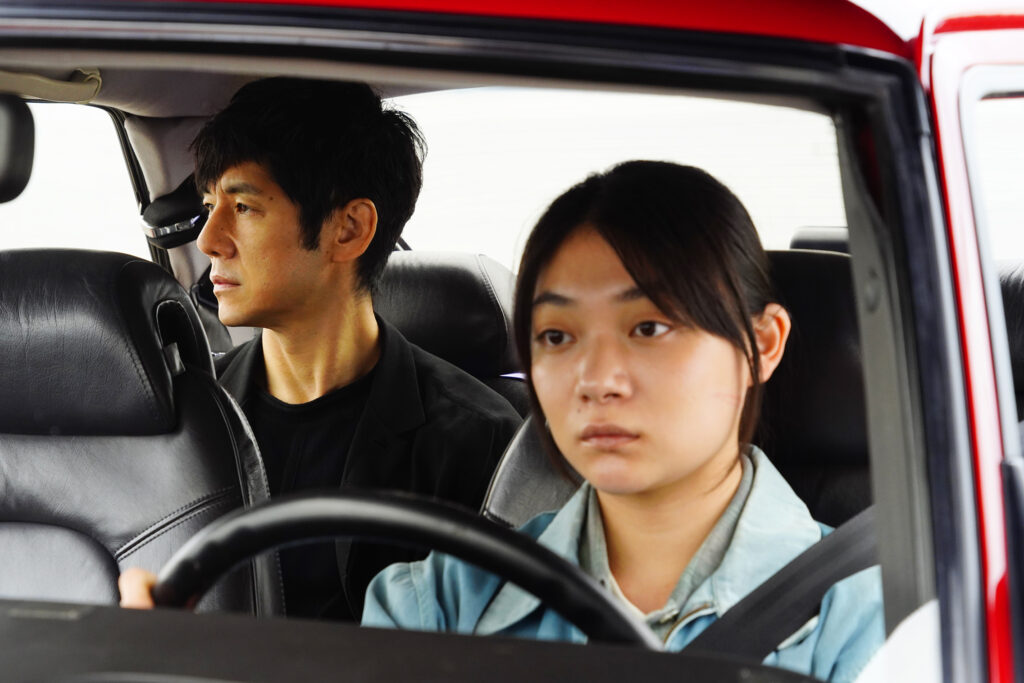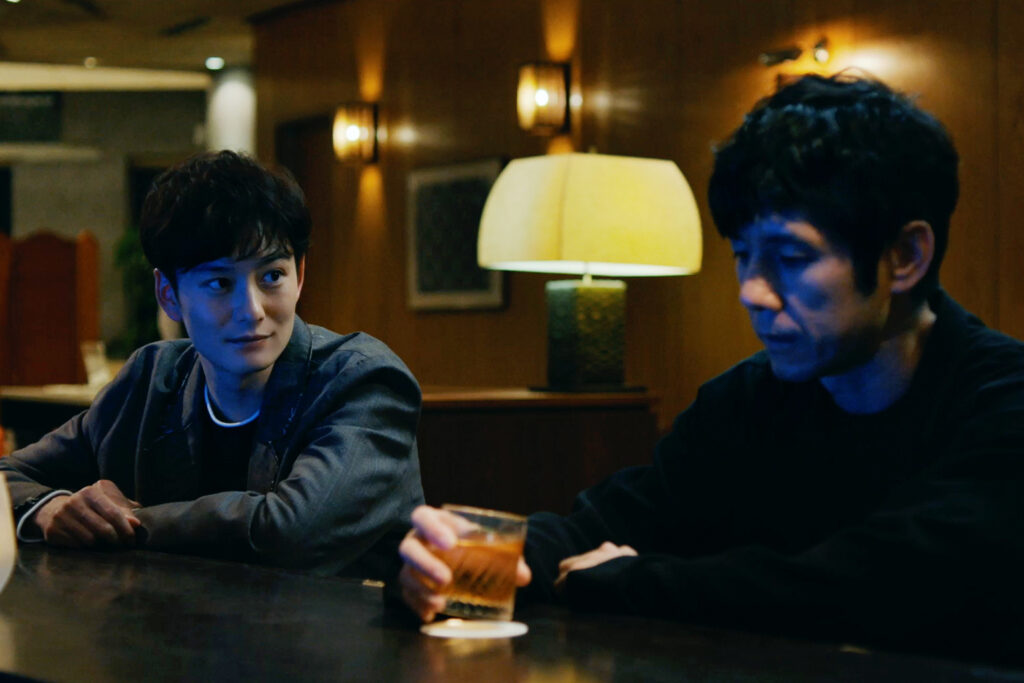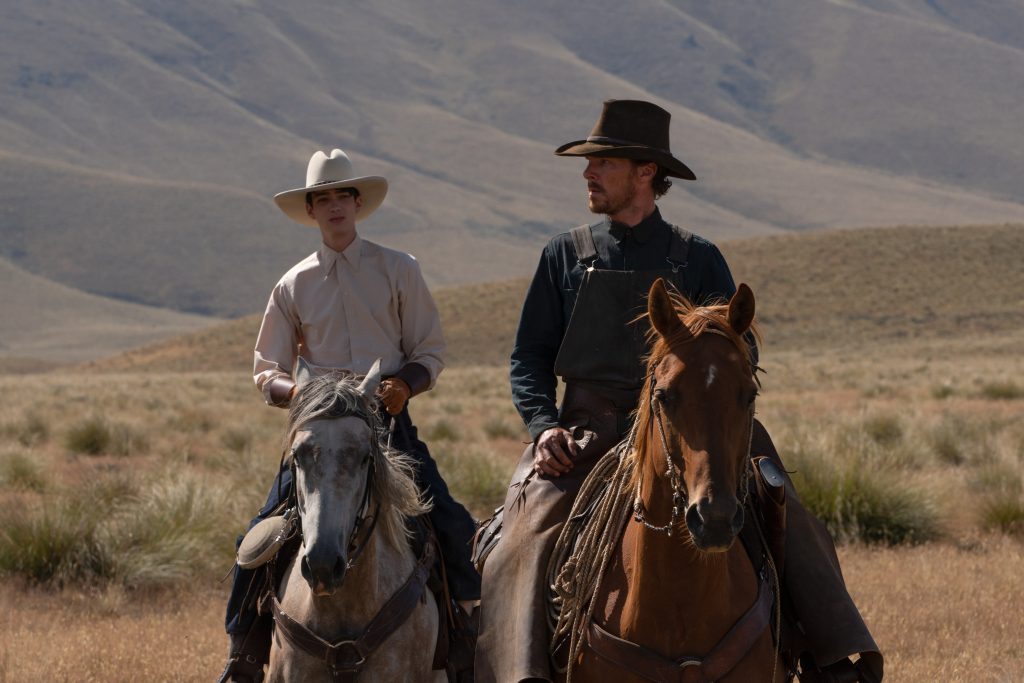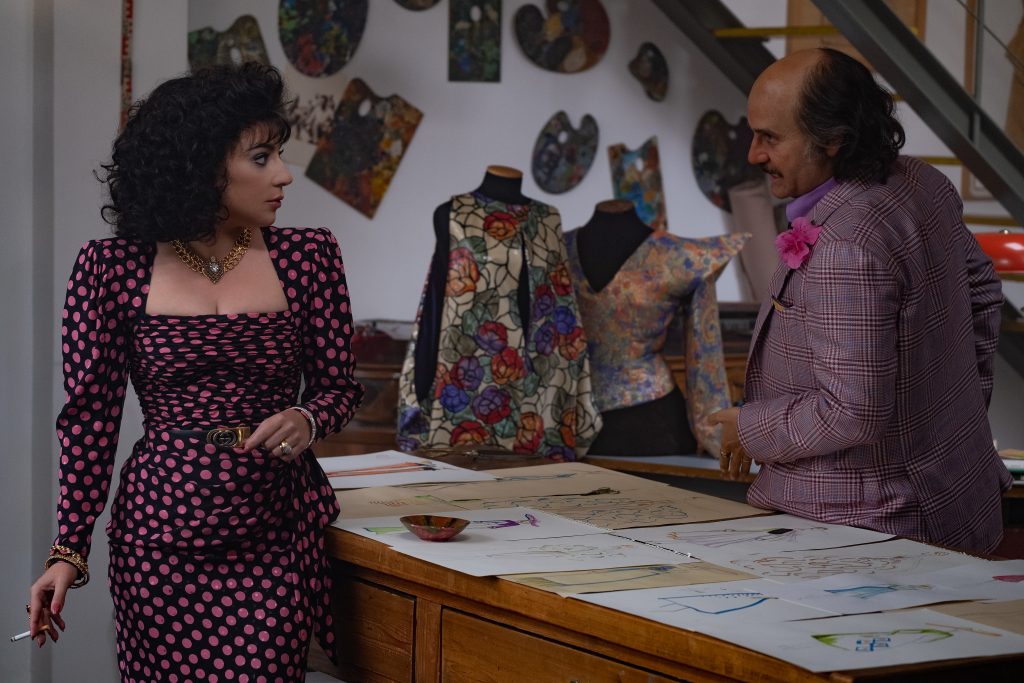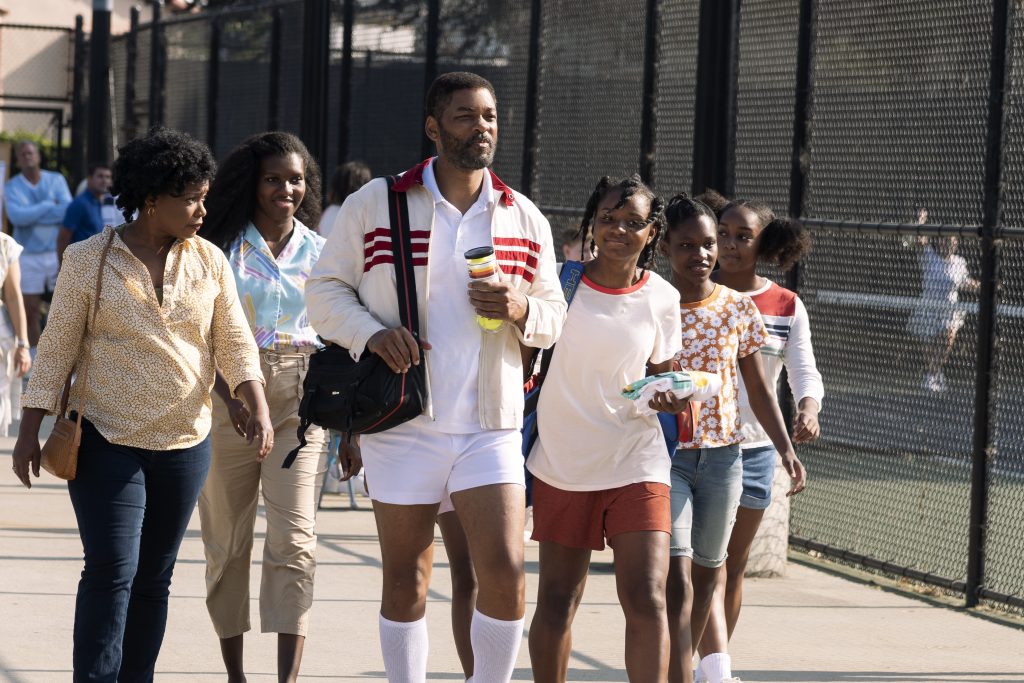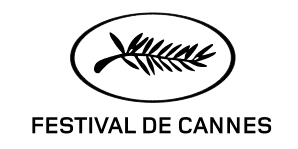March 27, 2022
by Carla Hay
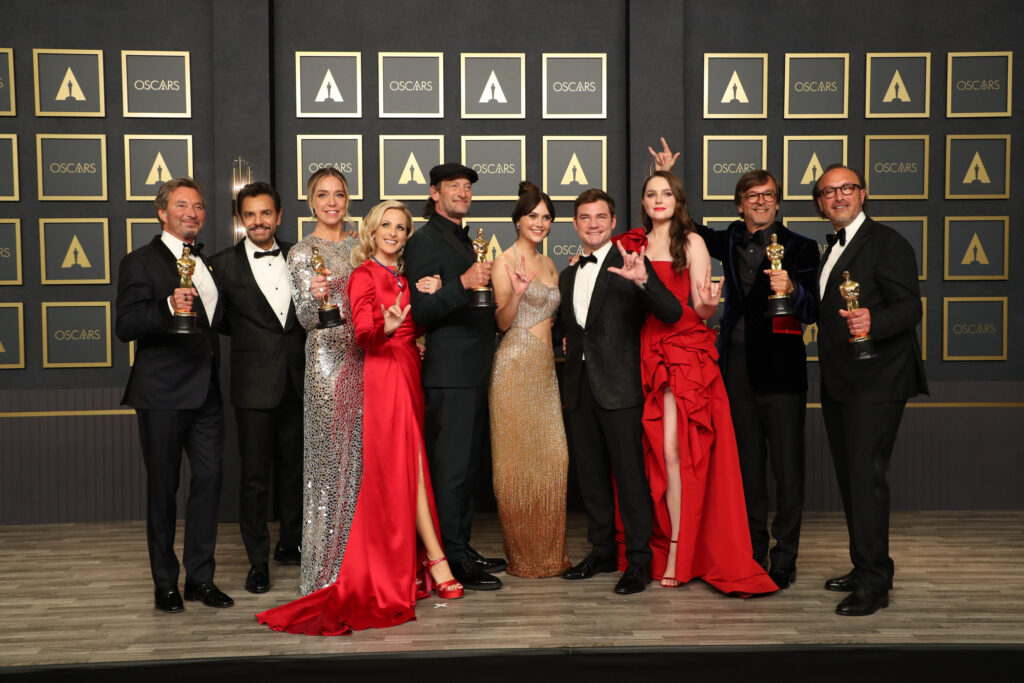
With three prizes, including Best Picture, Apple TV+’s drama “CODA” made Oscar history by being the first movie from a streaming service and the first movie with several deaf actors to win Best Picture. This historic victory happened at the 94th annual Academy Awards, which were presented at the Dolby Theatre in Los Angeles on March 27, 2022. Regina Hall, Amy Schumer and Wanda Sykes hosted the show, which was telecast in the U.S. on ABC. Eligible movies were those released in U.S. theaters between March 1 and December 31, 2021. The nominations and awards are voted for by the Academy of Motion Pictures Arts and Sciences.
Troy Kotsur of “CODA” also made history by becoming the first deaf male actor to win an Oscar. Kotsur took the prize for Best Supporting Actor. Marlee Matlin, who was the first deaf actress to win an Oscar (Best Actress for 1986’s “Children of a Lesser God”), also starred in “CODA.” Kotsur and Matlin portray a married couple in “CODA,” an acronym for “child of dead adults.”
In “CODA,” a hearing teenager named Ruby Rossi (played by Emilia Jones) has parents named Frank and Jackie (played by Kotsur and Matlin) and an older brother named Leo (played by Daniel Durant), who are all deaf. Ruby has to decide if she will stay in their hometown of Gloucester, Massachusetts, to help in the family’s fishing business or pursue her dream of being a singer at Berklee College of Music.
“CODA” is a remake of the 2014 French film “La Famille Bélier,” thereby making “CODA” the second movie remake (after 2006’s “The Departed”) to win the Academy Award for Best Picture. Unlike “La Famille Bélier,” which cast hearing actors as deaf people, “CODA” had deaf cast members in the roles of deaf people. “CODA” won all three of the Oscars for which it was nominated. In addition to Best Picture and Best Supporting Actor, the Oscar haul for “CODA” included Best Adapted Screenplay. “CODA” director Siân Heder adapted the screenplay.
Warner Bros. Pictures’ sci-fi remake of “Dune” won six of its 10 Oscar nominations: Best Film Editing, Best Cinematography, Production Design, Best Sound, Best Original Score and Best Visual Effects. Netflix’s Western drama “The Power of the Dog” went into the ceremony with the most nominations (12) and ended up winning just one: Best Director, for Jane Campion. The only other movie to win more than one Oscar at the ceremony was Searchlight Pictures’ Tammy Faye Bakker biopic “The Eyes of Tammy Faye”: Jessica Chastain won Best Actress, and the movie won the prize for Best Makeup and Hairstyling.
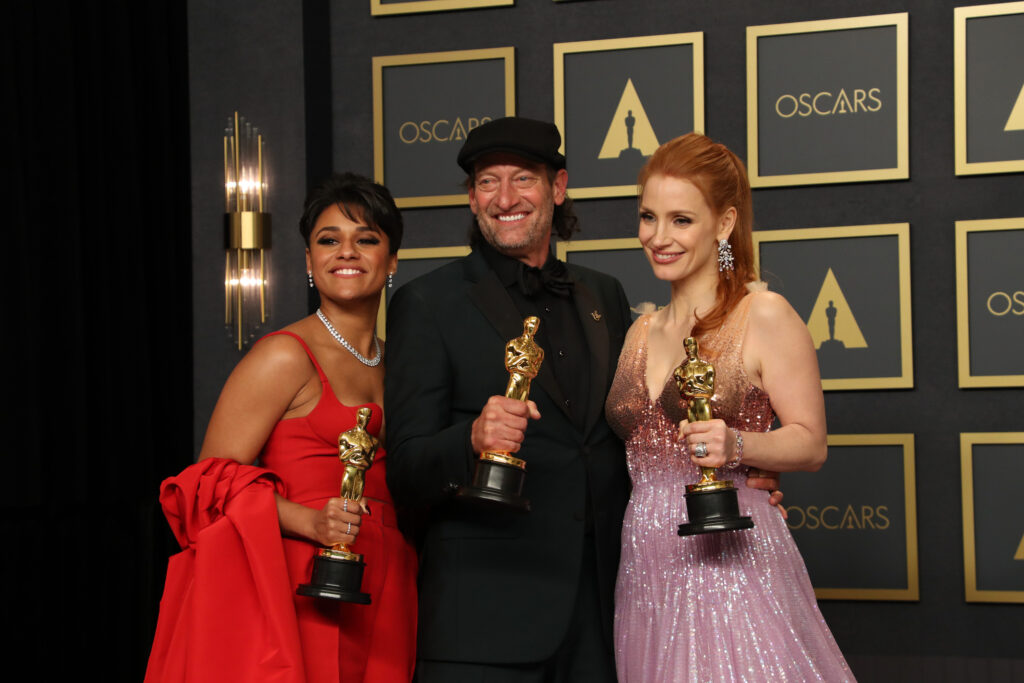
Ariana DeBose became the first openly queer woman to win an Academy Award for Best Supporting Actress. She won the prize for playing the role of Anita in the 2021 remake of “West Side Story,” which was DeBose’s acting debut in a feature film. It was the same role for which Rita Moreno won a history-making Academy Award for Best Supporting Actress in 1961’s “West Side Story,” which made Moreno the first Latin person to win an Oscar. Moreno attended the Oscar ceremony in 2022, and she looked on with pride and joy when DeBose took the stage to accept the award.
Despite all the accolades during the show, it will probably be most remembered for an unscripted moment when “King Richard” star Will Smith went on stage and punched presenter Chris Rock in the face, after Rock made an insulting joke about Smith’s wife, Jada Pinkett Smith, looking like G.I. Jane because of her close-cropped, shaved head. Pinkett Smith went public in 2021 about shaving her head because she has alopecia, a condition which causes large clumps of hair on a head to fall out. Rock was on stage to present the award for Best Documentary Feature. According to Variety, Smith also yelled at Rock after slapping him: “Keep my wife’s name out of your fucking mouth!”
This surprising altercation, which was followed by spurts of audio blocking and other technical interruptions to TV audiences, happened about 30 minutes before Smith won Best Actor for “King Richard,” in which he portrays Richard “Richie” Williams, the father and first tennis coach for tennis superstars Venus Williams and Serena Williams. Smith gave a tearful acceptance speech about protecting his family and being called to spread love.
Smith also said during the speech: “I want to apologize to the Academy. I want to apologize to all my fellow nominees. This is a beautiful moment and I’m not crying for winning an award. It’s not about winning an award for me. It’s about being able to shine a light on all of the people.” The Smith/Rock altercation is bound to be ranked as one of the most notorious moments in Oscar history.*
Other presenters at the show were Serena Williams, Venus Williams, Daniel Kaluuya, H.E.R., Josh Brolin, Jason Momoa, Wesley Snipes, Woody Harrelson, Rosie Perez, Jacob Elordi, Rachel Zegler, Tony Hawk, Kelly Slater, Shaun White, Stephanie Beatriz, Halle Bailey, Lily James and Naomi Scott, Naomi Scott, Tiffany Haddish, Simu Liu, Mila Kunis, Ruth E. Carter, Lupita Nyong’o, John Leguizamo, Jennifer Garner, Elliot Page J.K. Simmons, Shawn Mendes, Tracee Ellis Ross, Rami Malek, Tyler Perry, Jamie Lee Curtis, Bill Murray, Jill Scott, Sean Combs, Zoë Kravitz, Jake Gyllenhaal, Kevin Costner, Samuel L. Jackson, Uma Thurman, John Travolta, Anthony Hopkins, Lady Gaga and Liza Minnelli.
There were also performances of four of the five songs competing in the Best Original Son category: Beyoncé opened the show with her Oscar-nominated “Be Alive” from “King Richard,” by performing the song at a tennis court in Compton, California, as a nod to where Venus Williams and Serena Williams got their start. Sebastián Yatra sang “Dos Oruguitas” from “Encanto.” Reba McEntire sang “Somehow You Do” from “Four Good Days.” Billie Eilish and Finneas O’Connell performed the title track to “No Time to Die,” which won the Oscar. Due to touring commitments, Van Morrison did not attend the ceremony to perform his Oscar-nominated song “Down to Joy.” Instead, there was a performance of the “Encanto” hit song “We Don’t Talk About Bruno” by members of the “Encanto” cast with a special guest appearance by Megan Thee Stallion.
*April 1, 2022 UPDATE: After much controversy and media coverage of Smith’s physical assault of Rock at this Oscar ceremony, Smith has resigned from the Academy of Motion Picture Arts and Science. Read the full story here.
*April 8, 2022 UPDATE: The Academy of Motion Picture Arts and Sciences has announced that it is banning Smith from all Academy events for 10 years. Read the full story here.
Here is the complete list of winners and nominations for the 2022 Academy Awards:
*=winner
Best Picture
“Belfast,” Laura Berwick, Kenneth Branagh, Becca Kovacik and Tamar Thomas, producers
“CODA,” Philippe Rousselet, Fabrice Gianfermi and Patrick Wachsberger, producers*
“Don’t Look Up,” Adam McKay and Kevin Messick, producers
“Drive My Car,” Teruhisa Yamamoto, producer
“Dune,” Mary Parent, Denis Villeneuve and Cale Boyter, producers
“King Richard,” Tim White, Trevor White and Will Smith, producers
“Licorice Pizza,” Sara Murphy, Adam Somner and Paul Thomas Anderson, producers
“Nightmare Alley,” Guillermo del Toro, J. Miles Dale and Bradley Cooper, producers
“The Power of the Dog,” Jane Campion, Tanya Seghatchian, Emile Sherman, Iain Canning and Roger Frappier, producers
“West Side Story,” Steven Spielberg and Kristie Macosko Krieger, producers
Best Director
Kenneth Branagh (“Belfast”)
Ryûsuke Hamaguchi (“Drive My Car”)
Paul Thomas Anderson (“Licorice Pizza”)
Jane Campion (“The Power of the Dog”)*
Steven Spielberg (“West Side Story”)
Best Actor in a Leading Role
Javier Bardem (“Being the Ricardos”)
Benedict Cumberbatch (“The Power of the Dog”)
Andrew Garfield (“Tick, Tick … Boom!”)
Will Smith (“King Richard”)*
Denzel Washington (“The Tragedy of Macbeth”)
Best Actress in a Leading Role
Jessica Chastain (“The Eyes of Tammy Faye”)*
Olivia Colman (“The Lost Daughter”)
Penélope Cruz (“Parallel Mothers”)
Nicole Kidman (“Being the Ricardos”)
Kristen Stewart (“Spencer”)
Best Actor in a Supporting Role
Ciarán Hinds (“Belfast”)
Troy Kotsur (“CODA”)*
Jesse Plemons (“The Power of the Dog”)
J.K. Simmons (“Being the Ricardos”)
Kodi Smit-McPhee (“The Power of the Dog”)
Best Actress in a Supporting Role
Jessie Buckley (“The Lost Daughter”)
Ariana DeBose (“West Side Story”)*
Judi Dench (“Belfast”)
Kirsten Dunst (“The Power of the Dog”)
Aunjanue Ellis (“King Richard”)
Best Adapted Screenplay
“CODA,” screenplay by Siân Heder*
“Drive My Car,” screenplay by Ryusuke Hamaguchi, Takamasa Oe
“Dune,” screenplay by Jon Spaihts and Denis Villeneuve and Eric Roth
“The Lost Daughter,” written by Maggie Gyllenhaal
“The Power of the Dog,” written by Jane Campion
Best Original Screenplay
“Belfast,” written by Kenneth Branagh*
“Don’t Look Up,” screenplay by Adam McKay; story by Adam McKay and David Sirota
“King Richard,” written by Zach Baylin
“Licorice Pizza,” written by Paul Thomas Anderson
“The Worst Person in the World,” written by Eskil Vogt, Joachim Trier
Best Cinematography
“Dune,” Greig Fraser*
“Nightmare Alley,” Dan Laustsen
“The Power of the Dog,” Ari Wegner
“The Tragedy of Macbeth,” Bruno Delbonnel
“West Side Story,” Janusz Kaminski
Best Film Editing
“Don’t Look Up,” Hank Corwin
“Dune,” Joe Walker*
“King Richard”, Pamela Martin
“The Power of the Dog,” Peter Sciberras
“Tick, Tick…Boom!” Myron Kerstein and Andrew Weisblum
Best Sound
“Belfast,” Denise Yarde, Simon Chase, James Mather and Niv Adiri
“Dune,” Mac Ruth, Mark Mangini, Theo Green, Doug Hemphill and Ron Bartlett*
“No Time to Die,” Simon Hayes, Oliver Tarney, James Harrison, Paul Massey and Mark Taylor
“The Power of the Dog,” Richard Flynn, Robert Mackenzie and Tara Webb
“West Side Story,” Tod A. Maitland, Gary Rydstrom, Brian Chumney, Andy Nelson and Shawn Murphy
Best Original Score
“Don’t Look Up,” Nicholas Britell
“Dune,” Hans Zimmer*
“Encanto,” Germaine Franco
“Parallel Mothers,” Alberto Iglesias
“The Power of the Dog,” Jonny Greenwood
Best Original Song
“Be Alive” from “King Richard,” music and lyric by Dixson and Beyoncé Knowles-Carter
“Dos Oruguitas” from “Encanto,” music and lyric by Lin-Manuel Miranda
“Down to Joy” from “Belfast,” music and lyric by Van Morrison
“No Time to Die” from “No Time to Die,” music and lyric by Billie Eilish and Finneas O’Connell*
“Somehow You Do” from “Four Good Days,” music and lyric by Diane Warren
Best Animated Feature Film
“Encanto,” Jared Bush, Byron Howard, Yvett Merino and Clark Spencer*
“Flee,” Jonas Poher Rasmussen, Monica Hellström, Signe Byrge Sørensen and Charlotte De La Gournerie
“Luca,” Enrico Casarosa and Andrea Warren
“The Mitchells vs. the Machines,” Mike Rianda, Phil Lord, Christopher Miller and Kurt Albrecht
“Raya and the Last Dragon,” Don Hall, Carlos López Estrada, Osnat Shurer and Peter Del Vecho
Best International Feature Film
“Drive My Car” (Japan)*
“Flee” (Denmark)
“The Hand of God” (Italy)
“Lunana: A Yak in the Classroom” (Bhutan)
“The Worst Person in the World” (Norway)
Best Documentary Feature
“Ascension,” Jessica Kingdon, Kira Simon-Kennedy and Nathan Truesdell
“Attica,” Stanley Nelson and Traci A. Curry
“Flee,” Jonas Poher Rasmussen, Monica Hellström, Signe Byrge Sørensen and Charlotte De La Gournerie
“Summer of Soul (…Or, When the Revolution Could Not Be Televised),” Ahmir “Questlove” Thompson, Joseph Patel, Robert Fyvolent and David Dinerstein*
“Writing With Fire,” Rintu Thomas and Sushmit Ghosh
Best Makeup and Hairstyling
“Coming 2 America,” Mike Marino, Stacey Morris and Carla Farmer
“Cruella,” Nadia Stacey, Naomi Donne and Julia Vernon
“Dune,” Donald Mowat, Love Larson and Eva von Bahr
“The Eyes of Tammy Faye,” Linda Dowds, Stephanie Ingram and Justin Raleigh*
“House of Gucci,” Göran Lundström, Anna Carin Lock and Frederic Aspiras
Best Costume Design
“Cruella,” Jenny Beavan*
“Cyrano,” Massimo Cantini Parrini and Jacqueline Durran
“Dune,” Jacqueline West and Robert Morgan
“Nightmare Alley,” Luis Sequeira
“West Side Story,” Paul Tazewell
Best Production Design
“Dune,” production design: Patrice Vermette; set decoration: Zsuzsanna Sipos*
“Nightmare Alley,” production design: Tamara Deverell; set decoration: Shane Vieau
“The Power of the Dog,” production design: Grant Major; set decoration: Amber Richards
“The Tragedy of Macbeth,” production design: Stefan Dechant; set decoration: Nancy Haigh
“West Side Story,” production design: Adam Stockhausen; set decoration: Rena DeAngelo
Best Visual Effects
“Dune,” Paul Lambert, Tristan Myles, Brian Connor and Gerd Nefzer*
“Free Guy,” Swen Gillberg, Bryan Grill, Nikos Kalaitzidis and Dan Sudick
“No Time to Die,” Charlie Noble, Joel Green, Jonathan Fawkner and Chris Corbould
“Shang-Chi and the Legend of the Ten Rings,” Christopher Townsend, Joe Farrell, Sean Noel Walker and Dan Oliver
“Spider-Man: No Way Home,” Kelly Port, Chris Waegner, Scott Edelstein and Dan Sudick
Best Documentary Short Subject
“Audible,” Matt Ogens and Geoff McLean
“Lead Me Home,” Pedro Kos and Jon Shenk
“The Queen of Basketball,” Ben Proudfoot*
“Three Songs for Benazir,” Elizabeth Mirzaei and Gulistan Mirzaei
“When We Were Bullies,” Jay Rosenblatt
Best Animated Short Film
“Affairs of the Art,” Joanna Quinn and Les Mills
“Bestia,” Hugo Covarrubias and Tevo Díaz
“Boxballet,” Anton Dyakov
“Robin Robin,” Dan Ojari and Mikey Please
“The Windshield Wiper,” Alberto Mielgo and Leo Sanchez*
Best Live-Action Short Film
“Ala Kachuu – Take and Run,” Maria Brendle and Nadine Lüchinger
“The Dress,” Tadeusz Łysiak and Maciej Ślesicki
“The Long Goodbye,” Aneil Karia and Riz Ahmed*
“On My Mind,” Martin Strange-Hansen and Kim Magnusson
“Please Hold,” K.D. Dávila and Levin Menekse

